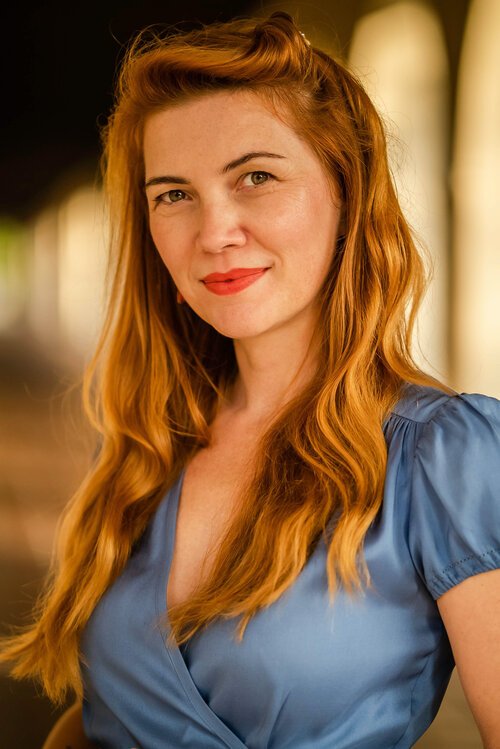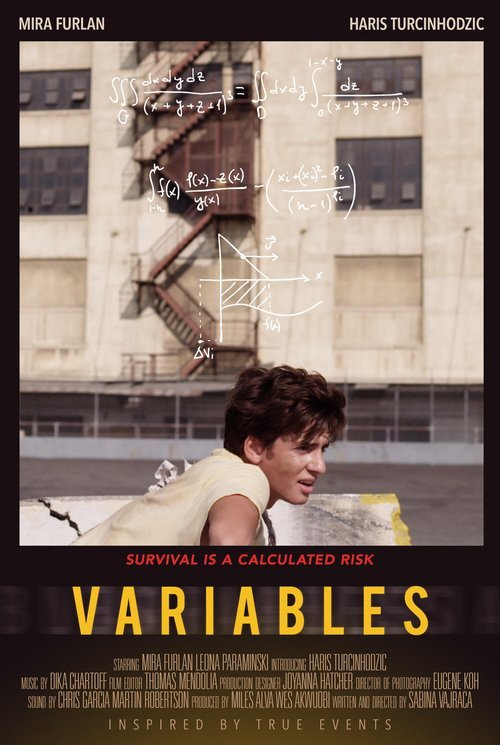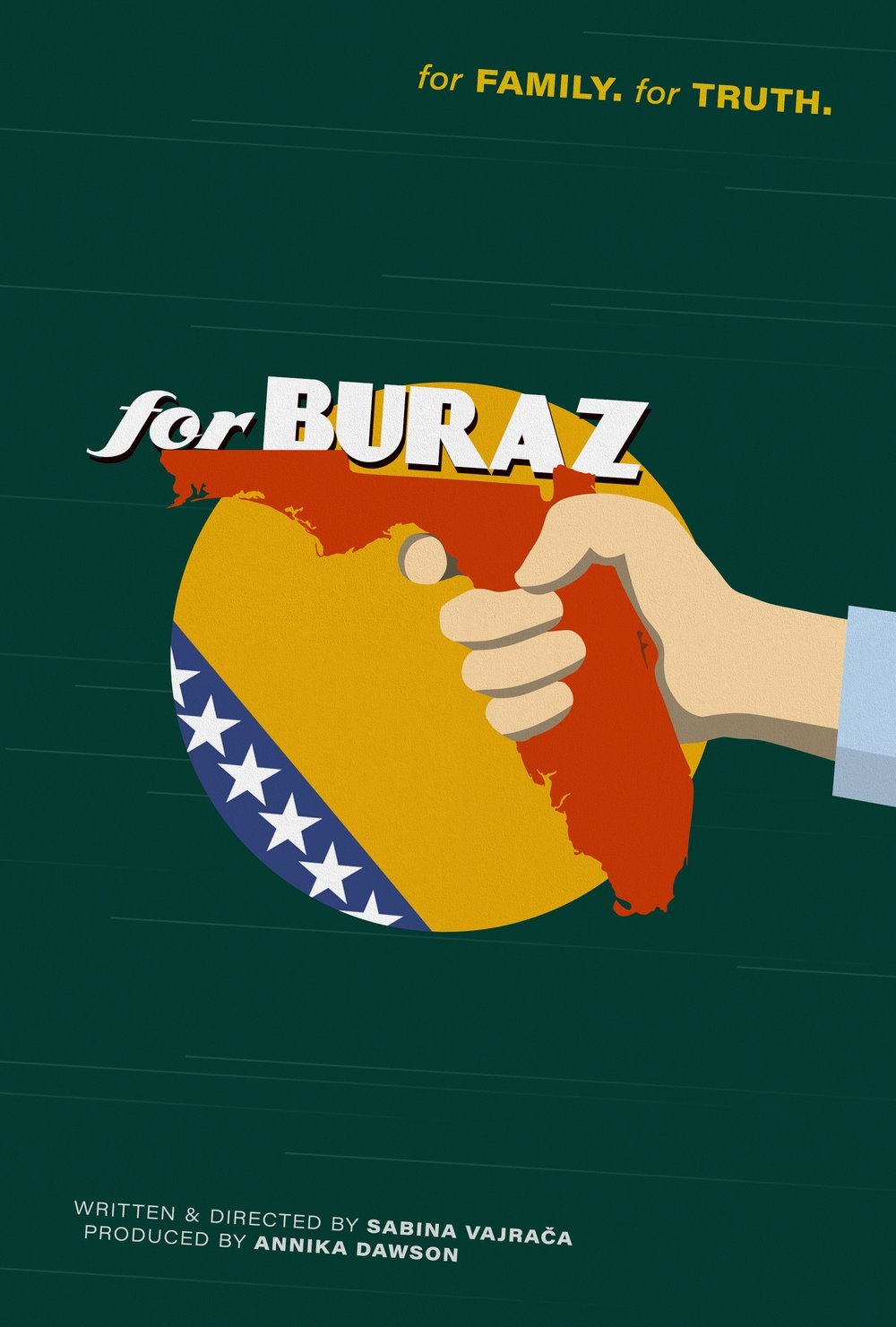Asking ‘Why’
THE PHILOSOPHICAL FILMMAKER NAVIGATES COMPLEXITY OF LIFE
By Robert Delaney
Writer/Director Sabina Vajrača
Sabina Vajrača is a writer and director whose wide ranging work channels her passions for theater, philosophy, and cinema, and revolves around her drive to communicate the complexity of her heritage, community, and experience as a Bosnian refugee and immigrant.
Sabina has a life-long passion for film. As she put it, “I made the decision to be a film director when I was eight years old, and I’m stubbornly stuck on that path for better or worse!” She grew up watching a multitude of films with her father, a noted cinephile himself, which galvanized her creative mind. “I really loved it, I loved spending time with my dad,” she said. “I think I was born to be a visual storyteller and being exposed to it at such an early age really just exemplified that part of my brain.”
It was also a major moment in Bosnian cinema history that sparked Sabina’s drive to be a film director. “When I was about eight, a very famous Bosnian director won the Palme D’Or,” she recounted…“It was this big deal in Bosnia and it was the first time I found out that there was such a thing as a director…The moment I found out that existed as a job, I said ‘I’m going to be that.’”
She was determined to follow a path to become a director, despite great troubles. “I started looking into it. I was going to go to film school. Then the war happened. The war came and derailed everything. Our lives as well as any dreams that any of us had, including my parents. So really for the next 15 years it was just survival,” she said.
Sabina was sent by her parents to live in Croatia to escape the war zone, where she first began to channel her creativity: “While I was there I stumbled into a theater company and found my people. I was very alone. I was a kid. I didn’t really have any support. I was traumatized by what was going on. My parents were far away. It was a very traumatic part of my life. In theater I found solace. I found a place where people welcomed me, embraced me, accepted me for who I was…I felt that theater saved my life.”
This new passion continued when Sabina and her family immigrated to the United States. She pursued an undergraduate degree in theater directing, became a director, and moved to New York. She would produce plays at institutions such as Lincoln Center, SITI Company, and Shakespeare & Company. Sabina would begin her first film project when her family was notified that the property that they owned in Bosnia was being returned to them by the government. The trip to claim that property became her feature documentary, Back to Bosnia, a film shot “in the style of cinema verité and interlaced with personal accounts.” Back to Bosnia premiered at AFI Fest and screened at 30 film festivals around the world.
From there she would make numerous independent short films with small film crews. Sabina used these projects to gain skills as a filmmaker. She thought, “Okay I’ll make my own film school,” and created a dozen short narrative films. Sabina also assisted a couple directors with their features, and after these experiences decided to go back to school. She received her MFA in Film and TV production from USC School of Cinematic Arts.
One of Sabina’s first major projects was Variables, which was the first spotlight film on our Alumni Curated Short Film Channel and a great anchor for the program. The project began with a true story about escaping the war zone in Bosnia. A good friend who was studying at MIT at the time, came to visit Sabina while she was still focusing on theater in New York. He brought along a fellow student who told the story that inspired the film: “He tells me this story of how he was in this math club and he was a math wiz and how his math club got pulled out of the war zone to go and compete in this math olympiad in Canada. I just thought, ‘Wow this is crazy, this is a Hollywood movie!’”
15 years later during her graduate studies, Variables would become a reality. Sabina was awarded a Sloan Grant to help support the project, and Variables would become her thesis film. The short mirrors the original true story of “a teenage math-wiz is given a way out of the bloodshed when his math club gets an invitation to compete at the 1995 International Math Olympiad in Canada.” For Sabina this was a return to making projects rooted in her past: “They were trying to push us to tell stories from our heritage, our backgrounds, as opposed to just general Hollywood stuff. I wasn’t really writing stuff about Bosnia before.”
One of her newest projects is connected with USC as well, on the Warner Brothers/USC feature Voodoo Macbeth. Sabina co-directed the film as a part of a class run by Professor John Watson. The film references the Federal Theatre Project’s adaptation of Macbeth in 1936, where Orson Welles adapted and directed the play with an all Black cast. For Sabina this was both a chance to direct a feature, and to channel her passion for Shakespearean theater. “I directed and studied Shakespeare, I knew Macbeth very well, I really became a de facto expert on set because I would help other directors understand what some of the Shakespeare meant. I love Shakespeare, I think he was a magician, such an incredible storyteller,” she said.
Sabina is working on numerous projects at the moment, with screenplays spanning television, shorts, and features. One of the most exciting current projects in active development is For Buraz, which is also a part of Stowe Story Labs’ Fiscal Agency program. Sabina recounted for me the essence of For Buraz: “When his younger brother dies under suspicious circumstances, and the police refuse to investigate, Kenan, a successful Bosnian-American banker, is forced into the dark underbelly of Florida’s Bosnian Muslim immigrant community in order to uncover what actually happened.”
With For Buraz, Sabina wants to communicate what it was like for Bosnian refugees fleeing war and coming to the US: “It’s an important story for me because it marries me as a Bosnian immigrant and as a refugee, and our experience. It’s very much a story about our community. We can blend in easily. People look at me and they don’t realize that first of all, I’m an immigrant, I’m a refugee, and second of all that my family is muslim. We pass for lack of a better term.”
“It’s about the first generation that I was a part of. All of us who came as children and how we adjusted or didn’t adjust to living in the United States with parents suffering from severe PTSD, not being able to take care of us but doing their best because we're a very family driven community. The whole community was trying to help but the whole community was broken. So what happens to the children who are raised in that environment and how do they cope, while at the same time we’re living in this land of wealth and opportunity and everyone thinks that you’re just an American. What happens to us? What happens to this generation where it’s easier to just blend in and become one of the Americans and stop speaking Bosnian because all you get from being Bosnian is trauma?”
As Sabina continues to expand her creative horizons, her passion for philosophy permeates much of her work. Philosophy is just as important to her as theater or cinema. As Sabina explains, “How theater saved my life when I was in the war, philosophy saved my life period.” 11 years ago Sabina found The School of Practical Philosophy, which has helped her immensely with working through trauma: “It answered a lot of questions I had in my life, and it helped this part of me that was very broken…Between meditation and philosophy really I’m a completely different person now than I was for all of my 20s, for most of my first part of my American life.” Now she is visualizing philosophy through her filmmaking: “It’s my purpose in this lifetime to use this talent that I was given as a visual storyteller to help people tap into their own wisdom and find a way to heal themselves. To figure out how to put these philosophical ideas on screen into this form that I am talented in.”
Sabina has been a part of our programs from multiple angles: as a participant, as a featured filmmaker, as part of our fiscal agency program, and we are grateful to have her as a part of our artist community. “Coming to Stowe was really remarkable in that way because it was just this amazing community of fellow writers. We were all there nervously trying to figure out how we are going to put our project together, but also supporting one another. The opportunity to read each other’s scripts, to share ideas, to get notes from one another, from your peers, from people that are on the same level as you are, is very different than when you get notes from somebody who is higher up or a professor.”
Robert Delany is an Academic Intern with Stowe Story Labs. He graduated in 2020 with an MA in cinema studies from NYU and was a Program Associate for the 2020 Flickers’ Rhode Island International Film Festival, where he now conducts interviews for their “Filmmaker Spotlight Series”. Robert also writes for Split Tooth Media, an independent film and music publication based in Portland, Oregon. He is currently acting as a researcher on the film ASCO: WITHOUT PERMISSION, directed by Travis Gutierrez Senger and produced by North of Now. He was also an Office Assistant at Senger’s production company, Asa Nisi Masa Films, where he focused on the development of numerous projects. Robert graduated in 2018 with a BS in film and TV from Boston University’s School of Communication. Robert Delany was selected for this academic internship to focus on interviews and other writing for The Story Board, Stowe Story Labs’ bi-monthly newsletter. He will also assist in the establishment of a curated short film platform for Stowe Alumni.




